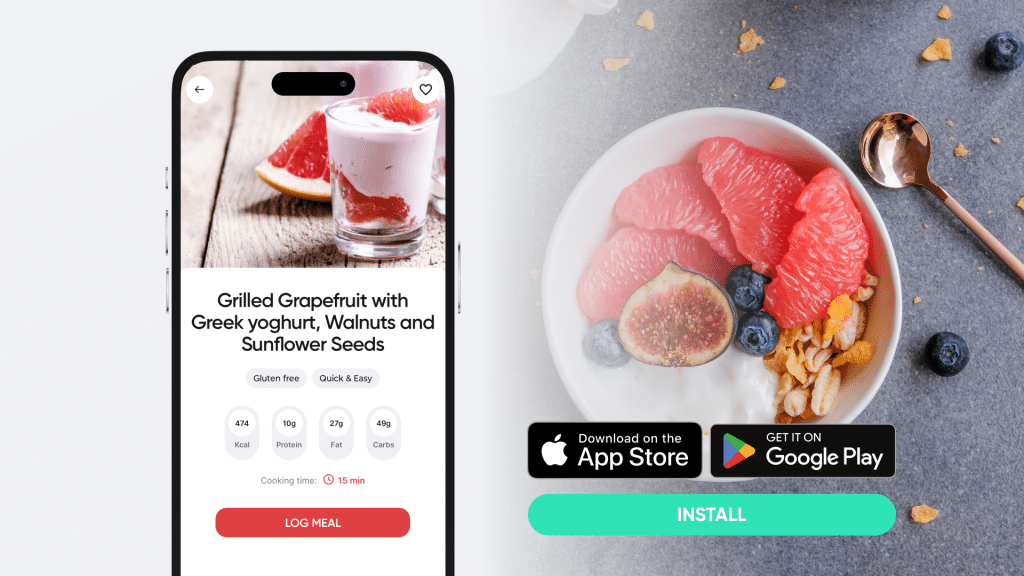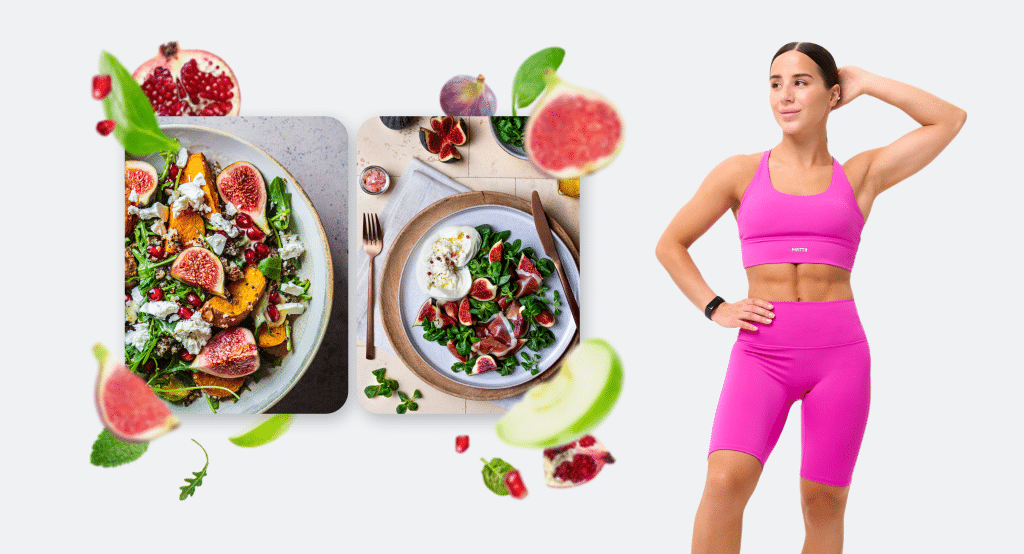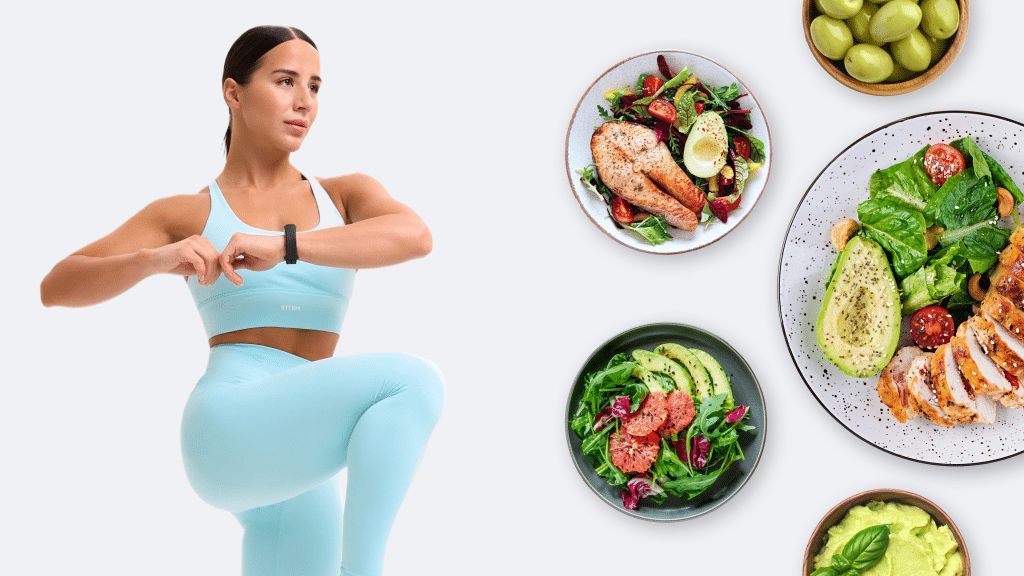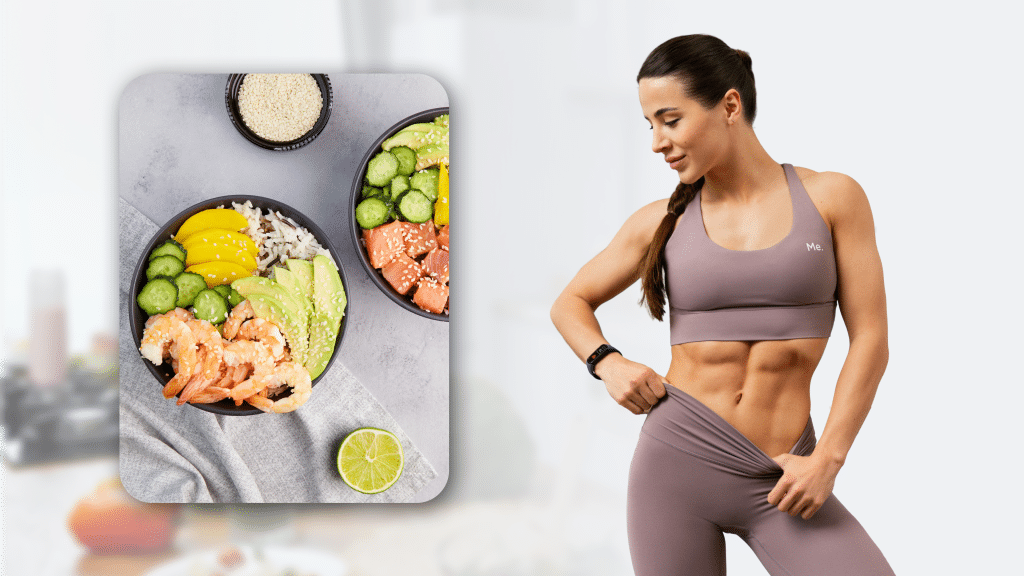If you’re thinking of a plant-based diet, this plant-based foods list will be of great help. With this list, you can identify the foods that you can include in your diet based on their nutritional value.
In recent years, plant-based foods have gained a lot of popularity all over the world. People with different health conditions are turning to these diets due to their nutrient profile, environmental concerns, and for health reasons (5).
What Is a Plant-Based Foods List?
A plant-based food list is a collection of foods that come from plants. These foods range from legumes, fruits and vegetables, healthy fats, and whole grains, to nuts and seeds. They are mostly considered healthy and rich in various types of nutrients, such as minerals, vitamins, and antioxidants.
These foods are often considered a healthier option due to their nutrient-dense nature. The list also focuses more on whole or minimally processed plant foods, rather than ultra-processed ones. As people seek healthier food options, plant-based foods have gained a great deal of popularity recently.
Plant-based diets or foods have been linked to numerous health benefits (3), including:
- Reduces the risk of cardiovascular or heart diseases
- Can help diabetics lose weight and manage blood sugar
- Helps lower cholesterol and blood pressure
- Reduces the risk of certain cancers
- Lowers body mass index (BMI) and is good for weight management.
- Good for improving gut health
It’s important to note that there are hundreds of plant-based foods that can form part of a delicious and nutritious diet. You should identify the ones you enjoy and can access to create a balanced diet meal for any occasion.
What Foods Can You Eat on a Plant-Based Diet?
If you’re on a plant-based diet, you can eat foods such as brown rice, broccoli, bananas, avocado, almonds, and chickpeas. Depending on your personal preferences, you may also eat some small amounts of certain animal products such as eggs and dairy.
What Are 30 Plant-Based Foods?
As mentioned, there are hundreds of plant-based foods that can enrich your diet. If you’re on a plant-based diet, this list will be helpful for identifying foods for your recipes. The list is categorized into vegetables, fruits, whole grains, healthy fats, nuts and seeds, and legumes.
When it comes to weight loss, progress is made by inches, not miles, so it’s much harder to track and a lot easier to give up. The BetterMe: Health Coaching app is your personal trainer, nutritionist, and support system all in one. Start using our app to stay on track and hold yourself accountable!
Vegetables
This plant-based list of foods is quite extensive:
- Broccoli – rich in vitamins A, C, and K and minerals such as calcium, iron, and potassium. It is also rich in antioxidants and high in fiber, potentially reducing inflammation and protecting the body from oxidative stress. The high fiber content promotes satiety and helps with digestion (7).
- Spinach – rich in vitamins C, A, and K and minerals such as potassium, iron, phosphorus, calcium, and magnesium. It also contains 2.9g of proteins, 2.2g of fiber, and 3.63 carbohydrates per 100 g (26), so it is a highly nutritious vegetable. It can be eaten raw as salads, blended in smoothies, or steamed.
- Onions – useful for flavoring dishes and rich in a variety of minerals, vitamins, dietary fiber, and other nutrients. They are known to contain B vitamins and minerals such as folate, potassium, and calcium. They also contain antioxidant and anti-inflammatory compounds that may help protect against chronic disease (18).
- Carrots – known to contain beta-carotene that is converted to vitamin A and is beneficial for eye and skin health. They are also rich in fiber and antioxidants that help with digestion and support the immune system (9). Carrots are versatile and you can eat them raw, in soups and stews, roasted, steamed, boiled, in smoothies, or in salads.
- Tomatoes – rich in vitamins C, A, and K, lycopene antioxidants, and other nutrients. These nutrients promote good skin and heart health (30). They also contain 95% water content, which helps promote hydration. You can eat tomatoes in salads, soups, or smoothies, and they can be consumed raw or cooked.
Fruits
When creating your plant-based foods list, pay attention to the following products:
- Bananas – contain natural sugars that provide a quick energy boost. They also contain other beneficial nutrients and minerals including fiber, potassium, manganese, magnesium, folate, vitamin C, and vitamin B6. In terms of calories, 100g of bananas contain approximately 110 calories (6). You can blend your bananas into smoothies, eat them whole and fresh, or make a fruit salad, among other ways.
- Strawberries – rich in vitamin C, antioxidants, calcium, potassium, phosphorus, and magnesium, among other nutrients (27). Enjoying these fruits is one of the most delightful experiences you can ever have. Eat them whole and fresh, make fruit salads, bake them in desserts, or slice them and eat them with your breakfast.
- Apples – a good source of vitamin C, fiber, and phytochemicals such as anthocyanin, quercetin, and catechin. They may help reduce the risk of type 2 diabetes and there are numerous other benefits (4). You can enjoy apples in different ways, including apple pies, whole and fresh, or in smoothies. You can also explore some of the healthy baked apple recipes you can try with your apples.
- Grapes – rich in vitamins C and K and antioxidants such as quercetin and anthocyanins. They are also rich in minerals such as potassium, phosphorus, and calcium (11). Eat them fresh and whole, blend them into smoothies, or add them to your salads.
- Oranges – if you’re looking for an excellent source of vitamin C, you should eat plenty of oranges. They also contain fiber, folate, and minerals such as potassium, calcium, magnesium, and phosphorus, in addition to antioxidants such as carotenoids and flavonoids (19). You can juice oranges, eat them fresh and whole, or add them to your fruit salads.
Whole Grains
- Brown Rice – a good source of carbohydrates, fiber, magnesium, selenium, and phosphorus. In addition, it also contains 248 calories per 1 cup serving (23) and provides a good source of energy.
- Oats – nutritious and contain minerals, fiber, and vitamins. Oats are known to contain vitamins B1 or thiamine, and minerals such as zinc, phosphorus, iron, manganese, and folate. They are also a source of plant-based proteins, which makes them good for muscle repair, and complex carbohydrates for energy. In addition, they are beneficial in supporting the immune system, lowering cholesterol, and weight management (16).
- Quinoa – whole grains that are rich in manganese, folate, magnesium, vitamin B1, and phosphorus. It is considered a complete protein as it contains all nine amino acids that are essential for our bodies (21).
- Corn – if you’re looking for a good source of carbohydrates to boost your energy, try corn. Whether boiled, roasted, or grilled, you can enjoy corn in many ways. It is also rich in vitamin A and contains some vitamin C. It also contains small amounts of valuable minerals such as magnesium and potassium (13).
- Whole-Wheat Bread – a healthy plant-based food that is rich in nutrients. It is an option if you are a newbie who is looking for a plant-based diet for beginners. It’s a good source of complex carbohydrates that provide energy and is also rich in B vitamins (niacin and folate). Some of the minerals in whole-wheat bread include iron, zinc, and magnesium (31).
Healthy Fats
Let’s consider a plant-based foods list consisting of healthy fats:
- Olive Oil – a versatile ingredient for a variety of culinary purposes. Olive oil is a great choice that is high in monounsaturated fatty acids (MUFAs) and antioxidant compounds. The MUFAs help increase the good cholesterol level (HDL) in the body while lowering the bad cholesterol (LDL) (17). For culinary purposes, you can use it to dress your salads or for cooking.
- Avocado – one of the versatile and widely known foods in many parts of the world. It is known to contain healthy fats. In addition, eating avocados may help keep obesity away. You can scoop the flesh and enjoy it plain with a sprinkle of salt, spread it on toast, mix it with salads, make guacamole, or blend it with fruits to make smoothies.
- Flaxseed Oil – known to be high in alpha-linolenic acid (ALA) content, which may come with numerous health benefits that include anti-inflammatory, cardiovascular protection, and overall well-being of the heart and skin (10). You can use it as salad dressing, drizzle it over cooked vegetables, use it for baking, or add it to your smoothies.
- Hemp Seeds – rich in omega 3 and omega 6 essential fatty acids, among other nutrients. The seeds also contain proteins with all nine amino acids that are essential for human health (29). They are also rich in fiber and are good for promoting gut health. Being versatile, you can blend them into your smoothies, sprinkle them in salads, or use them as a topping.
- Chia Seeds – believed to support heart health, reduce inflammation and oxidative stress, promote digestion, and suppress appetite. They are rich in antioxidants, fiber, and omega-3 fatty acids. With chia seeds, you can make chia pudding, blend them in smoothies, or sprinkle them on salads.
Read more: Ketotarian Meal Plan: What You Need To Know About This Plant-Based Way Of Eating
Nuts and Seeds
- Walnuts – these can be roasted, added to your salads, or eaten raw. They contain essential nutrients that include omega-3 fatty acids (alpha-linolenic acid (ALA)) and antioxidants, and are good for gut, brain, and heart health (2).
- Almonds – rich in vitamin E, fiber, magnesium, healthy fats, and proteins and are good for lowering cholesterol levels in the body, lowering blood pressure, improving gut health, and promoting the health of the heart (1).
- Cashews – eating cashews comes with a lot of health benefits that include reducing bad cholesterol, preventing heart diseases, and preventing and managing type 2 diabetes. They are rich in proteins, vitamins K and B6, magnesium, phosphorus, and manganese (12).
- Pumpkin Seeds – have many benefits that include reducing the risk of cardiovascular diseases, improving gut health, reducing the risk of diabetes, and improving bone health. Pumpkin seeds contain fiber, magnesium, antioxidants, and unsaturated fats (24).
- Pecans – healthy and nutritious and can be added to salads, eaten as a snack, or used as a topping for your oatmeal. Pecans are rich in fiber, proteins, antioxidants, and healthy fats. In addition, they contain vitamin E, phosphorus, Zinc, and magnesium and are good for improving digestion, reducing inflammation, and building strong bones and muscles (14).
Legumes
- Soybeans – if you’re looking for vegetarian snacks with protein for your breakfast, soybeans are ideal. They are rich in proteins, healthy fats, and fiber, and are good for the health of the bones and cardiovascular system(25).
- Lentils – contain high-quality plant-based proteins, essential amino acids, magnesium, folate, iron, and fiber. They help improve digestive health, promote heart health, and are helpful for weight management (15).
- Peanuts – rich in proteins, fiber, and healthy oils. With peanuts, which we include to our plant-based list of foods, you can make peanut butter smoothies, roast them, or eat them as snacks. With low glycemic index (GI) and low glycemic load, they’re also good for maintaining blood sugar levels (22). However, it’s important to note that peanuts have a high calorie content. An ounce of peanuts contains approximately 161 calories (20).
- Chickpeas – great sources of plant-based protein, B vitamins, minerals, and fiber. Chickpeas are helpful for weight management (28) as their protein and fiber help keep you feeling full for longer.
- Tofu – tofu is a healthy plant-based food rich in proteins and essential amino acids, vitamins, isoflavones, antioxidants, and minerals that are essential for providing energy, supporting heart health, and overall health and well-being (8).
Is 100% Plant-Based the Same as Vegan?
Yes, 100% plant-based is essentially the same as vegan. This is because it is comprised of 100% plant foods. There is no one definition of a plant-based diet. They usually focus on foods from plants but sometimes may include some animal products, depending on individual preferences. However, if it is 100% plant foods, then that is the same as vegan as vegan is a diet that is strictly from plant foods with no animal products. Vegans also typically avoid anything that involves animal exploitation and is not necessarily limited to their diet.
Read more: 21 Days Vegan Diet: The Beginner’s Guide To Plant-Based Dieting
What Are Plant-Based Foods to Avoid?
The list of plant-based foods you may want to avoid or limit includes ultra-processed foods that are high in added sugars or salt and highly refined grains that lack nutrients and fiber. Sugary beverages and alcohol can be vegan but aren’t really helpful if you’re trying to eat healthy or lose weight.
FAQs
Is pasta plant-based?
Yes, pasta is a plant-based food and a suitable addition to your plant-based diet. However, some pasta types may contain animal products such as eggs or dairy, but most others are 100% made from whole wheat and are considered plant-based.
Is bread plant-based?
Yes, most breads are plant-based. The main ingredients of bread include flour, yeast, water, and salt. However, some may not be suitable for a plant-based diet if they’re made from ingredients that contain more animal products such as eggs, honey, and milk. To be sure, you should check the ingredients list.
Are potatoes plant-based?
Yes, potatoes are plant-based. They are mostly complex carbs with little protein or fat content. They are also rich in vitamins and minerals, especially potassium.
Is cheese plant-based?
Cheese is not plant-based. It is made from milk, which is an animal product. However, plant-based cheese alternatives are available and they are often made from cashews.
The Bottom Line
You now know what a plant-based diet and plant-based foods are, their nutritional values, and how you can enjoy them. In addition, you have all the insights you need to know about these types of food, and you can now make a perfect recipe of your choice.
We’ve just sampled 30 plant-based foods in our list from all categories – fruits, vegetables, whole grains, healthy fats, nuts and seeds, and legumes. If you’re preparing a plant-based meal plan or a vegetarian diet plan, I would encourage you to read through our list of foods and make choices that are balanced and suitable for your health needs.
DISCLAIMER:
This article is intended for general informational purposes only and does not serve to address individual circumstances. It is not a substitute for professional advice or help and should not be relied on for making any kind of decision-making. Any action taken as a direct or indirect result of the information in this article is entirely at your own risk and is your sole responsibility.
BetterMe, its content staff, and its medical advisors accept no responsibility for inaccuracies, errors, misstatements, inconsistencies, or omissions and specifically disclaim any liability, loss or risk, personal, professional or otherwise, which may be incurred as a consequence, directly or indirectly, of the use and/or application of any content.
You should always seek the advice of your physician or other qualified health provider with any questions you may have regarding a medical condition or your specific situation. Never disregard professional medical advice or delay seeking it because of BetterMe content. If you suspect or think you may have a medical emergency, call your doctor.
SOURCES:
- 3 Surprising Health Benefits of Almonds You Might Not Know (2023, almonds.com).
- 4 Health Benefits of Walnuts and How Much You Should Eat (2024, health.ucdavis.edu).
- A Look at Plant-Based Diets. Missouri Medicine (2021, ncbi.nlm.nih.gov).
- Apples (n.d., nutritionsource.hsph.harvard.edu).
- Are Plant-Based Alternatives Healthier? A Two-Dimensional Evaluation From Nutritional and Processing Standpoints (2023, sciencedirect.com)
- Bananas (n.d., nutritionsource.hsph.harvard.edu).
- Broccoli: A Multi-Faceted Vegetable for Health: An In-Depth Review of Its Nutritional Attributes, Antimicrobial Abilities, and Anti-inflammatory Properties (2023, ncbi.nlm.nih.gov).
- Clearing Up Questions on Whether Tofu Is Healthy (2022, heart.org).
- Exploring the Health Benefits and Utility of Carrots and Carrot Pomace: A Systematic Review (2024, researchgate.net).
- Flaxseed Oil: Extraction, Health Benefits and Products (2021, researchgate.net).
- Grapes, Raw (2020, fdc.nal.usda.gov).
- Health Benefits of Cashews (2023, webmd.com)
- Health Benefits of Corn (n.d., hopkinsmedicine.org).
- Health Benefits of Pecans (2024, webmd.com).
- Health-Promoting Benefits of Lentils: Anti-Inflammatory and Anti-Microbial Effects (2024, ncbi.nlm.nih.gov).
- Impact of Oats on Appetite Hormones and Body Weight Management: A Review (2023, ncbi.nlm.nih.gov).
- Olive Oil Health Benefits and Why You Should Add It to Your Diet (2024, health.ucdavis.edu).
- Onion Nutrition (n.d., onions-usa.org).
- Oranges, Raw, All Commercial Varieties (2019, fdc.nal.usda.gov).
- Peanuts, All Types, Raw (2019, fdc.nal.usda.gov).
- Quinoa (n.d., nutritionsource.hsph.harvard.edu).
- Review on Health Benefits of Peanuts (2022, researchgate.net).
- Rice, Brown, Long-Grain, Cooked (Includes foods for USDA’s Food Distribution Program) (2019, fdc.nal.usda.gov).
- Seed of The Month: Pumpkin Seeds (2023, health.harvard.edu).
- Soybeans and Soy Foods (n.d., betterhealth.vic.gov.au).
- Spinach, Raw (2019, fdc.nal.usda.gov).
- Strawberries, Raw (2019, fdc.nal.usda.gov).
- The Nutritional Value and Health Benefits of Chickpeas and Hummus (2016, ncbi.nlm.nih.gov).
- The Role of Hemp (Cannabis sativa L.) as a Functional Food in Vegetarian Nutrition (2023, ncbi.nlm.nih.gov).
- Tomatoes: An Extensive Review of the Associated Health Impacts of Tomatoes and Factors That Can Affect Their Cultivation (2022, ncbi.nlm.nih.gov).
- Whole Grains (n.d., nutritionsource.hsph.harvard.edu).














